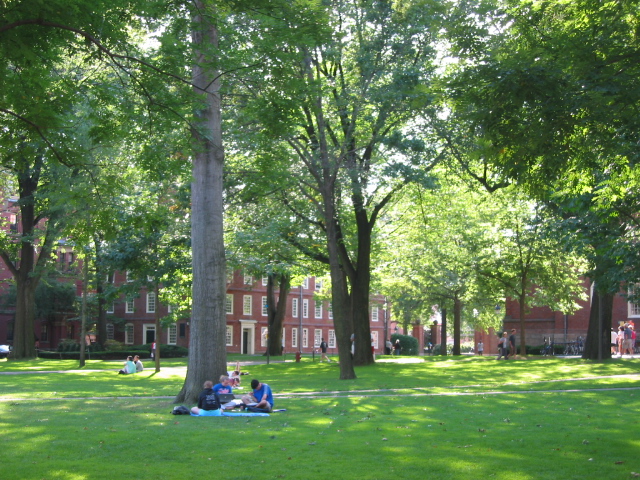 In “Asian American Students and School Stereotypes“, the Washington Post reports on Jenny Tsai, a recent Harvard graduate, for her senior college thesis for the social studies department last year, wrote the study “‘Too Many Asians at this School’: Racialized Perceptions and Identity Formation.” (Update: you can download the “essay” here) The article goes on in describing her study and findings:
In “Asian American Students and School Stereotypes“, the Washington Post reports on Jenny Tsai, a recent Harvard graduate, for her senior college thesis for the social studies department last year, wrote the study “‘Too Many Asians at this School’: Racialized Perceptions and Identity Formation.” (Update: you can download the “essay” here) The article goes on in describing her study and findings:
“As part of her research, Tsai, who is Chinese American, interviewed 27 Harvard undergraduates, including 15 Asian Americans and 12 whites, plus one Asian American student at Boston College. All but one had attended one of four very selective public high schools — Boston Latin in Boston, Lowell in San Francisco and Hunter College and Stuyvesant in New York. She chose graduates of those schools because of their large Asian American contingents — roughly 75 percent at Lowell, 50 percent at Hunter College and Stuyvesant and 25 percent at Boston Latin — and because each of those schools had struggled with racial issues sparked by the fact that many students who want to attend can’t get in. Tsai, a Hunter College High School alumna herself, found many people thought Asian American students were getting more than their share of acceptance letters from these super magnets. Yet she saw little racial solidarity among the Asian Americans who did so well at those four schools that they got into Harvard. Instead, these students told her they were just trying to fit in with what they considered “white” American values, and often deferred to their white classmates when it came to extracurricular choices. As Tsai put it, among the Asian American students she interviewed, “acting white” was a good thing. I was surprised to read that Tsai’s subjects at Harvard often embraced that term. They thought of it more as a lifestyle than an academic strategy. To them, Tsai found, it translated loosely as being cool….
Many Asian American students at Harvard, Tsai said, were bothered by the stereotype of their group as a “model minority,” which they associated with the fear expressed by some whites that Asian Americans were putting them at a disadvantage. To them, that stereotype carried with it “negative connotations of being competitive, lacking passion, and being calculating,” she wrote in her paper.“
27 Harvard undergraduates (and a Boston College student) does not sound like a large sample, but I don’t think Jenny Tsai, as an undergraduate, necessarily had the time and resources for a large representative sample to extrapolate beyond her Ivy League halls (except to Boston College). So this isn’t necessarily the definitive study of Asian American “model minority” perceptions at college campuses (as well as K – 12), but it does bring up some valid observations.
By the way, I find some irony that this Harvard senior thesis is being reported on, considering my previous posting on Harvard’s lack of Asian American Studies program.
This article reminds me on a fairly “infamous” front page article in the Wall Street Journal in 2005 (before 8Asians.com’s time) on the Cupertino, California school system.
“Whites aren’t quitting the schools because the schools are failing academically. Quite the contrary: Many white parents say they’re leaving because the schools are too academically driven and too narrowly invested in subjects such as math and science at the expense of liberal arts and extracurriculars like sports and other personal interests. The two schools, put another way that parents rarely articulate so bluntly, are too Asian…the shrinking number of white students hasn’t hurt the academic standards of Cupertino’s schools — in fact the opposite is true. This time the effect is more subtle: Some Asians believe that the resulting lack of diversity creates an atmosphere that is too sheltering for their children, leaving then unprepared for life in a country that is only 4% Asian overall. Moreover, many Asians share some of their white counterpart’s concerns. Both groups finger newer Asian immigrants for the schools’ intense competitiveness.”
I think with most immigrant parents, there is definitely an emphasis on academics rather than extracurricular activities. As I have blogged and commented before, I think there are “two” Asian America’s – West Coast/California Asians and the rest of the U.S. – both groups, I have found, have felt “culture shock” from moving to California or vice versa – I certainly did. Back to the point…
As the Washington Post article did state, overall, Asia-Americans account for about 4% of the U.S. population. Whenever there is a statistical “over-representation” that can be easily observed, questions, concerns, and stereotypes will arise. Obviously, people individually need to move beyond stereotypes, but being aware of them and also noting some truthfulness and recognizing that stereotypes exist is one step towards eliminating them.
I wonder, after reading this article, if the “model minority” stereotype has translated into the workforce? I haven’t really read too many articles or studies on this subject. Academic success, as far as I understand, has not translated into corporate success, where many Asian Americans (even in San Francisco / Silicon Valley) have been hitting the glass or “bamboo” ceiling. Any thoughts on the “model minority” stereotype or the “bamboo ceiling”?







